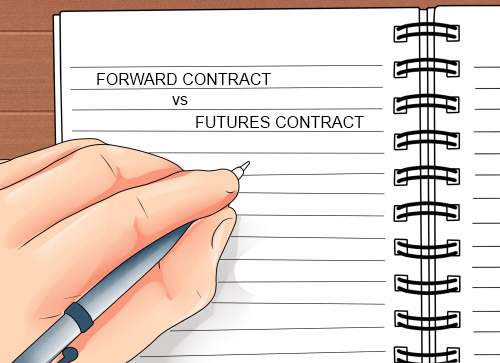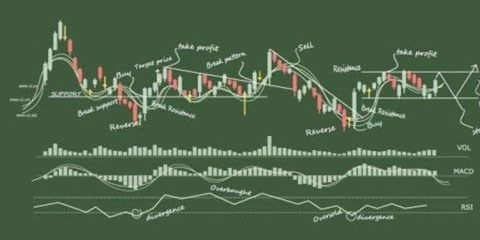Companies and investors utilize future and forward agreements, or futures and forwards, to make bets on the future or protect against potential losses. Values of imitative assets like futures and forwards are based on those of financial funds. Both types of contracts involve securing an asset at a certain value, but they operate differently.
Forward Contract: What Is It?
The term "forward contract" refers to a negotiated agreement between two different individuals to acquire or trade an item at a future date and value. The non-standardized character of a forward agreement makes it suitable for offsetting, while it may also be used for speculating.
Example of Forward Contract
Let's pretend for a moment that a farmer is worried that perhaps the value of peanuts will fall because he has so much of the crop. The farmer makes a deal with a bank to sell 4 million baskets of peanuts at $7.08 a basket in 6 months to minimize his exposure to price fluctuations. The contract's monetary obligations will be settled in cash, as mutually agreed upon by the stakeholders.
At the point of settlement, peanut prices might go in a few different directions. The agreed-upon cost is accurate. All financial obligations under the contract have been satisfied as per the terms of the contract.
The final pricing is cheaper than what was discussed. Even if the price falls below $7 a basket, the deal will be finalized at the agreed-upon price. As a result, the wager to protect against a potential price reduction was successful.
There was a price increase from what was discussed. However much more the manufacturer may have made at a greater price per basket, the transaction is completed at the agreed-upon price.
Futures Contract: What Is It?
A futures contract is a legally binding agreement to purchase or sell a certain physical asset or securities at a defined price at a defined period in the future. You can do it at any point in the future. Futures trading has regulated qualitative and quantitative parameters to make future market transactions easier.
The person who purchases a futures contract assumes the responsibility to purchase and take delivery of the underlying securities when the term of something like the futures contract ends. The person who sells the futures contract assumes the responsibility of providing and delivering the investment product when the agreement reaches its termination date.
Example of Future Contract
Futures contracts are frequently used by oil-producing countries when trading in their product. As a result, they can set a firm selling price and guarantee a smooth transaction upon the termination date. However, imagine that Organization A worries that a drop in demand may alter oil prices and hurt its bottom line. After anticipating a reduction in oil prices over the next 6 months, the corporation locks in a futures contract at $70 per gallon.
Even if demand falls and oil costs fall to $65 per gallon, Organization A may still execute the agreement at the agreed-upon $75 per gallon price, yielding a gain of $20 per gallon. However, Organization A is likely to lose $10/ gallon from the agreement if sales grow and the cost of oil climbs to $100 per gallon. Keeping in mind that even if the rates stay the same for approximately six months, there will be no risk involved.
Forward Contracts vs. Futures Contracts

Financial products, such as forward and futures contracts, are agreements between entities to either acquire or distribute property at a particular price and time in the future. Imprisoning a purchasing or selling cost in advance protects both parties from any price increases or decreases in the future.
An OTC forward contract is a unilateral agreement with a single settlement date after the contract term. The deal's specifics are worked out through negotiations between the two parties. Because the competitor is accountable for making payments, there is an element of nonperforming loans because it was arranged secretly.
However, futures contracts are standard agreements traded on trading platforms. Since this is the case, they are resolved regularly. These agreements have standard terms and a predetermined period of maturation. Futures have less risk since they provide payment on the stipulated date.
The different rules that apply to forward obligations and futures contracts are among the key differences between the two. Contrary to futures contracts, which a centralized government agency supervises, forward agreements are completely unregulated.
The CFTC, also known as Commodity Futures Trading Commission, is the government organization monitoring and regulating futures transactions. The Commodity Futures Trading Commission (CFTC) was founded in 1974 with the goals of regulating the financial sector, ensuring that the markets operate effectively, and safeguarding the interests of shareholders by avoiding fraud and price manipulation.
Assurances are also issued for each deal by a variety of different entities. Because forwards are held secret, they give the security necessary to complete the transaction. Moreover, futures are backed by financial institutions, which offer an institutional warranty for the contracts that support them. In contrast to forwards, which do not need a reserve or margin till the transaction is settled, futures do necessitate the payment of one. This serves as protection to offset the risk of the obligation being defaulted on.
Are Forward Contracts Brought Up to Date with the Current Market?

The market value of forwarding contracts is never taken into account. This is because these were only resolved on the day arranged for the closing date. This is an important distinction to make when compared to futures that are tagged to the marketplace.
Major Drawbacks of a Forward Contract
A forward contract's primary drawbacks are as follows.
- They are traded over the top, and the terms are kept confidential since they are discussed secretly.
- Thus, these derivatives lack oversight and carry a higher degree of danger. Before the agreement's settlement date, payment is not assured.




